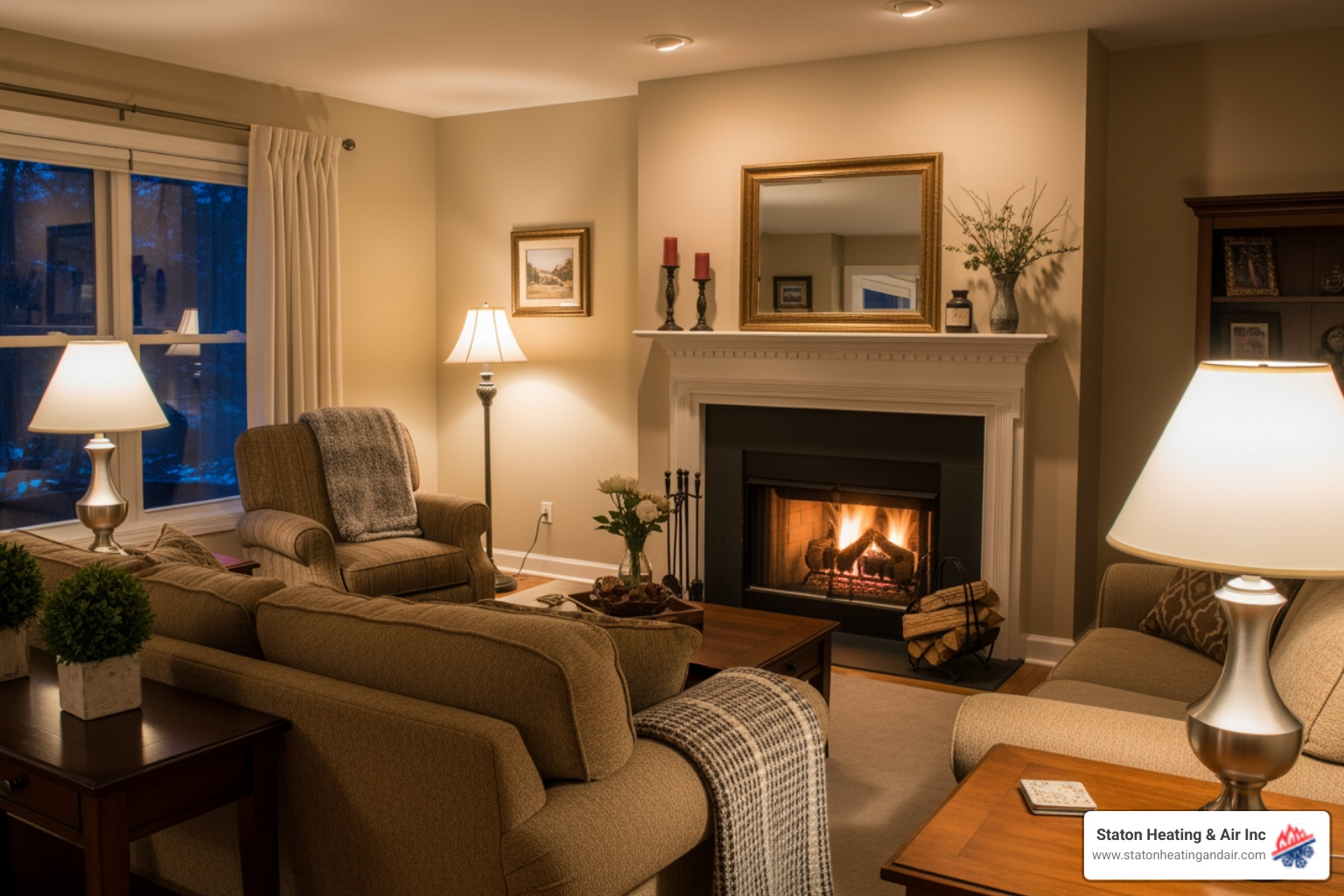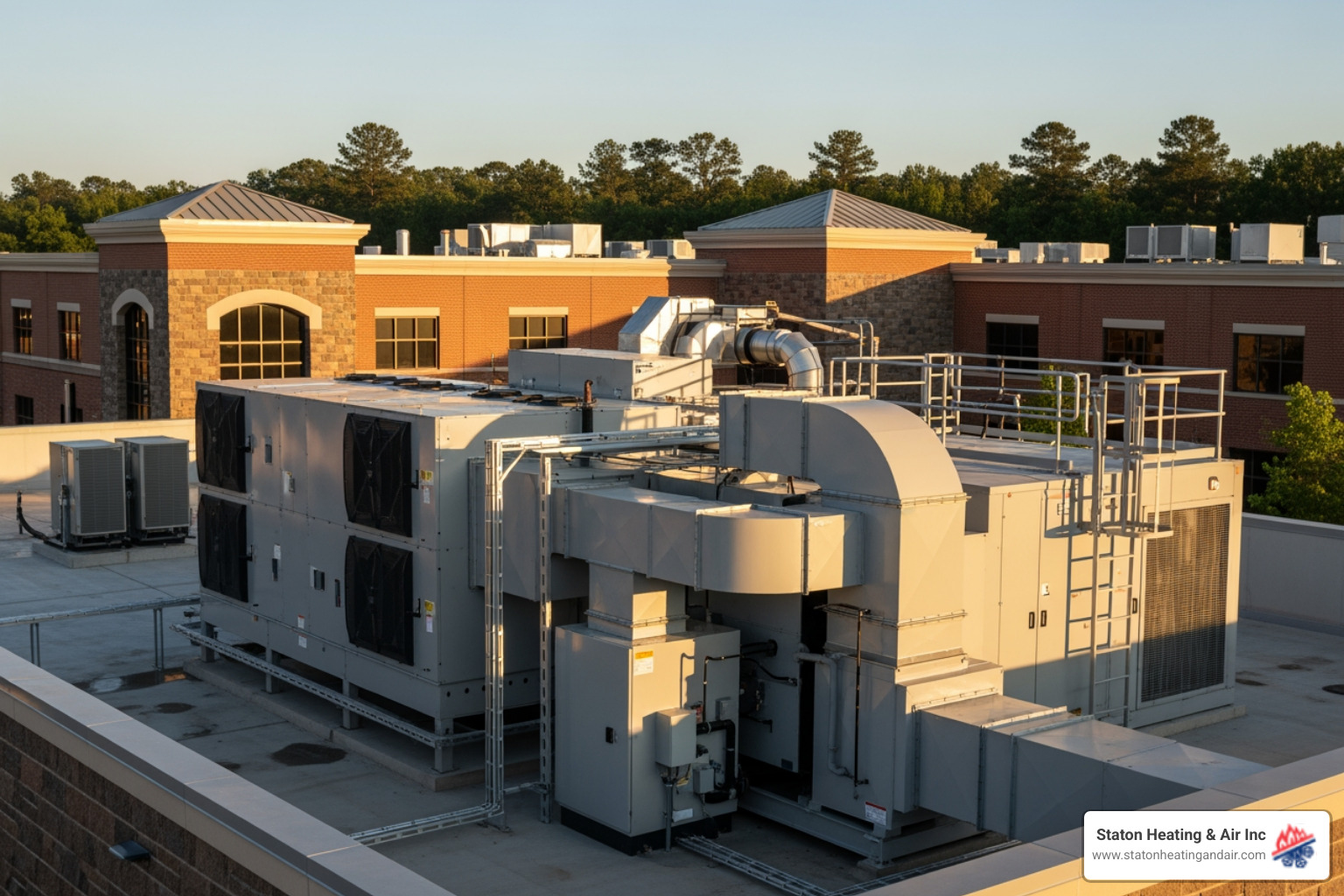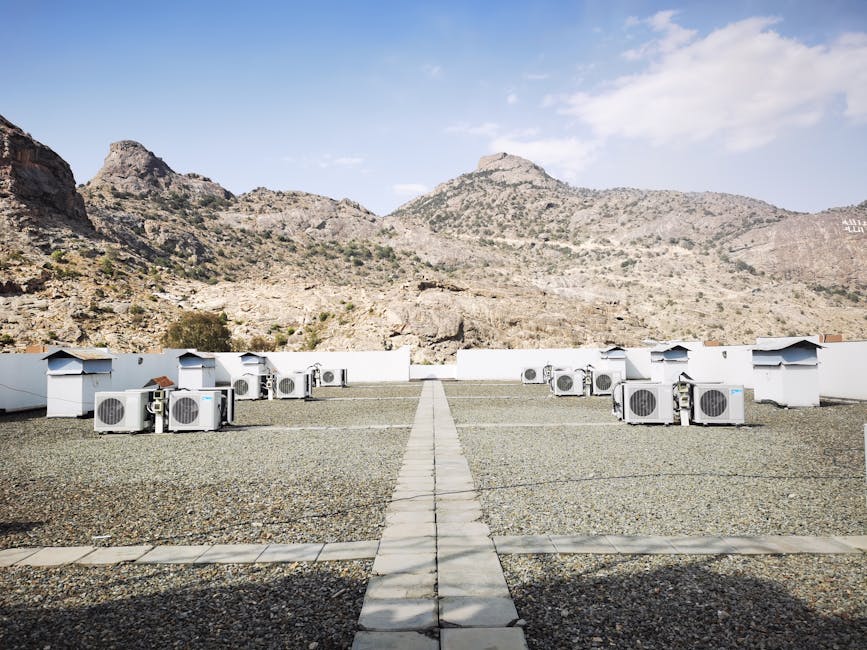The Cold Truth: Why Your AC Isn't Cooling Your Home
When Your AC Betrays You on the Hottest Day
AC blowing warm air is a frustrating problem, especially during Georgia's sweltering summers. You expect cool relief but get a blast of warm air instead.
Quick Diagnosis Guide for AC Blowing Warm Air:
- Check thermostat settings - Ensure it's set to "Cool" and fan is on "Auto"
- Inspect air filter - Replace if dirty or clogged (every 1-3 months)
- Look for tripped circuit breakers - Reset outdoor unit breaker if needed
- Check for blocked vents - Remove furniture or debris blocking airflow
- Listen for unusual sounds - Hissing may indicate refrigerant leaks
The good news is that many causes have simple DIY solutions, while others need professional help to prevent costly damage. Understanding the potential issues helps you take the right action.
Most common culprits include:
- Incorrect thermostat settings
- Dirty air filters restricting airflow
- Low refrigerant levels from leaks
- Frozen evaporator coils
- Electrical issues with the outdoor unit
Let's diagnose what's stealing your cool comfort.
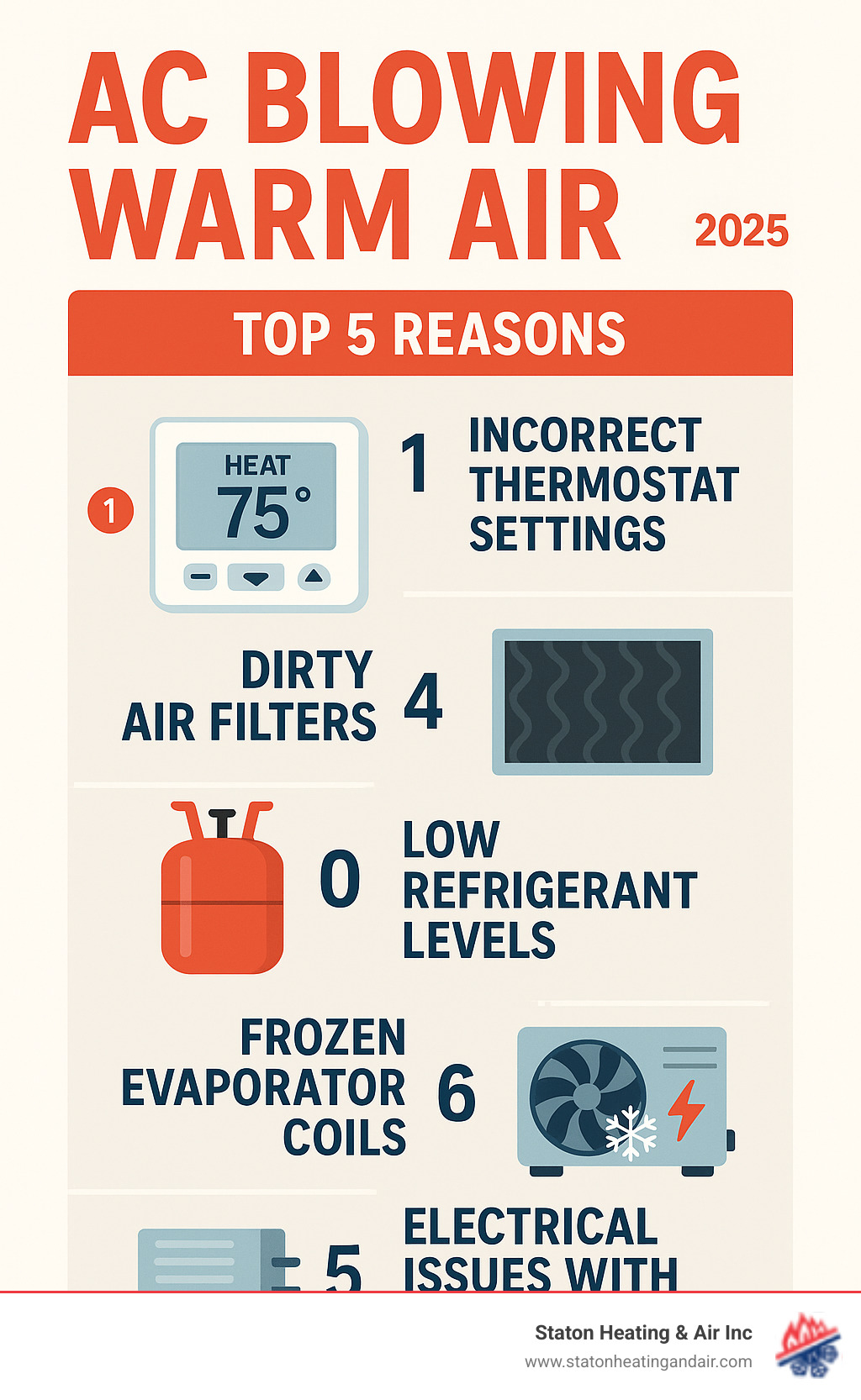
First, Understand How Your Air Conditioner Cools Your Home
To understand why your AC is blowing warm air, it helps to know how it works. Your AC doesn't create cold air; it moves heat from inside your home to the outside.
This process uses a special fluid called refrigerant in a closed loop. Here's a quick breakdown:
- Evaporator Coil (Indoor): Warm indoor air is pulled across this coil. The refrigerant inside absorbs the heat, turning from a liquid to a gas.
- Blower Motor: This fan pulls in warm air and pushes the newly cooled air through your vents.
- Compressor (Outdoor): This is the heart of your AC. It pressurizes the refrigerant gas, making it very hot.
- Condenser Coil (Outdoor): A fan blows outside air over this coil, releasing the absorbed heat. The refrigerant cools and turns back into a liquid, ready to repeat the cycle.
When any part of this heat exchange cycle fails, you'll feel warm air from your vents. Understanding the cooling process helps you spot problems early.
Troubleshooting Why Your AC is Blowing Warm Air: From Simple Fixes to Major Faults

When your AC is blowing warm air, don't panic. Many cooling problems have simple solutions you can handle yourself. Work through these common issues systematically, starting with the easiest fixes.
Safety first: Always turn off power to your AC unit at the circuit breaker before inspecting it. While some fixes are DIY-friendly, others require a professional to avoid costly or dangerous mistakes.
Incorrect Thermostat Settings: The Simplest Reason for an AC Blowing Warm Air
Surprisingly often, the problem is just an incorrect thermostat setting. Before assuming the worst, perform a quick thermostat check:
- Mode: Ensure it's set to "Cool," not "Heat" or "Off."
- Fan Setting: Use "Auto," not "On." The "On" setting makes the fan run constantly, circulating uncooled air between cooling cycles, which can feel like your AC is blowing warm air.
- Temperature: Set the temperature a few degrees below the current room temperature to ensure the cooling cycle engages.
- Batteries: Replace dead or low batteries in your thermostat, as they can cause communication errors.
- Schedules: Check your smart thermostat's schedule for any programmed settings that might be raising the temperature.
Clogged Air Filters are Restricting Airflow
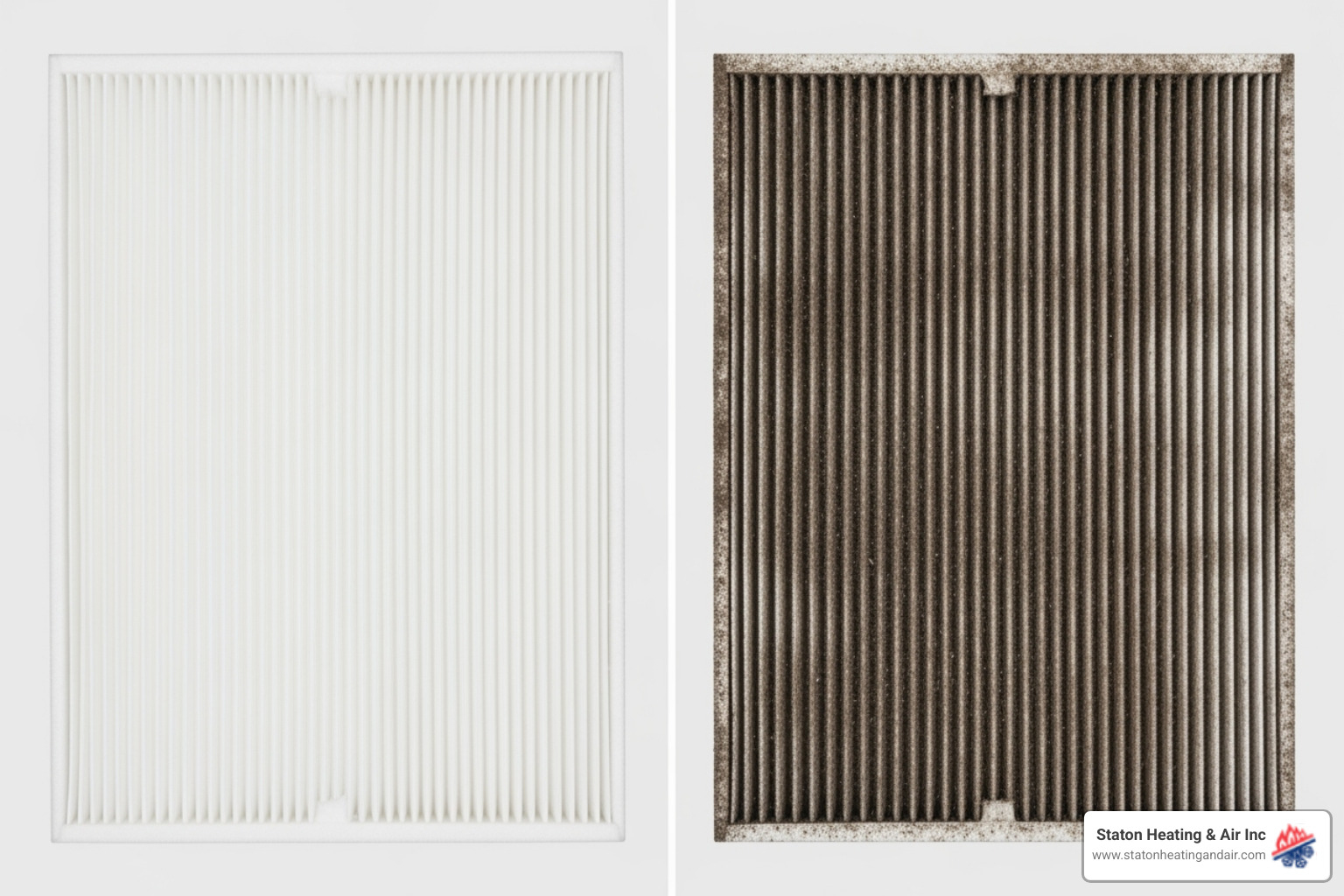
A dirty air filter is a top reason for an AC blowing warm air. When the filter is clogged with dust and debris, it severely restricts airflow. This reduced airflow prevents your system from pulling in enough air to cool effectively, leading to system strain, higher energy bills, and potential damage.
Even if the AC is running, it can't cool your home properly without adequate airflow. This simple fix can prevent your system from not cooling the house.
How often should you change filters? Check your filter monthly and replace it every 1-3 months. Homes with pets or allergies may require more frequent changes.
Tripped Circuit Breakers or Power Issues
If your AC is blowing warm air, the problem could be electrical. Your indoor unit might have power, but the outdoor unit, which does the cooling, may not.
- Check the Circuit Breaker: Go to your electrical panel and find the breaker for your AC or outdoor unit. If it's tripped (in the "off" or middle position), flip it fully off, then back on. If it trips again immediately, call a professional.
- Check the Outdoor Unit: Is the outdoor condenser fan spinning? If not, it has no power. Also, check the nearby disconnect switch (a small box on the wall) to ensure it's in the "on" position.
- Blown Fuses: Older homes may have fuses. It's best to have a professional handle fuse issues.
Blocked Vents and Registers
Your AC can't cool your home if air can't circulate. Blocked vents and registers are a common cause of poor cooling and can make it feel like your AC is blowing warm air.
- Check All Vents: Walk through your home and ensure that furniture, rugs, or drapes are not blocking any supply (air blowing out) or return (air pulling in) vents.
- Keep Vents Open: Don't close vents in unused rooms. This can create pressure imbalances that strain your system and reduce efficiency.
- Clean Vent Grilles: Regularly wipe down vent covers to remove dust buildup that can restrict proper airflow.
Deeper HVAC Issues That Require a Professional
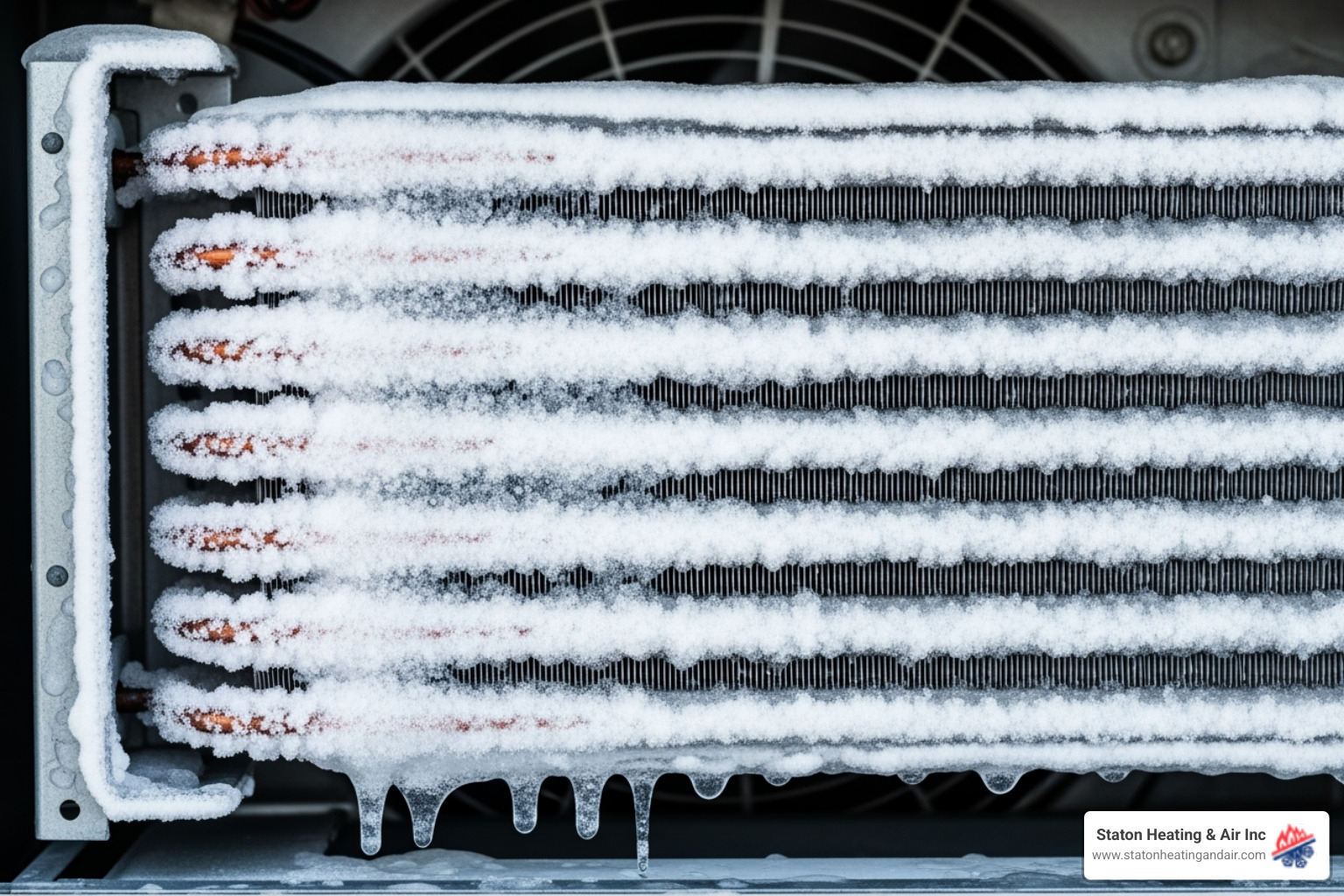
If the simple fixes don't work, your AC blowing warm air might be caused by a deeper issue. These problems require a NATE-certified technician for safe and accurate diagnosis and repair. Attempting DIY fixes on these complex components can lead to more expensive damage. Recognizing these signs early can save you money and discomfort.
Low Refrigerant: The Most Common Culprit When Your AC is Blowing Warm Air
Low refrigerant is a very common reason for an AC blowing warm air. Your AC is a sealed system, so low levels mean there's a refrigerant leak. Simply refilling it won't fix the underlying problem.
Signs of a leak include:
- Hissing or bubbling sounds near AC components.
- Frost or ice buildup on refrigerant lines or coils.
- Spiking energy bills as the system struggles to cool.
A professional must find and repair the leak using specialized tools. Older systems using R22 refrigerant, which is being phased out, can be very expensive to repair, sometimes making replacement a better option.
Frozen Evaporator Coils
Ironically, ice on your AC is a sign it can't cool. A frozen evaporator coil acts as an insulator, blocking heat absorption. This is why your AC blows warm air or has very weak airflow.
If you see ice on the indoor coil or refrigerant lines, turn the AC cooling off but set the fan to "On" to help thaw the ice. Do not run the AC with frozen coils.
Freezing is usually caused by:
- Restricted airflow from a dirty air filter.
- Low refrigerant levels from a leak.
Repeated freezing can also lead to musty or moldy smells from mold growth, so it's important to address the root cause.
Dirty Condenser Coils or Outdoor Unit
The outdoor unit's job is to release heat. If its condenser coils are covered in dirt, leaves, or grass clippings, they can't do this effectively. The trapped heat forces the system to work harder, eventually causing warm air blowing from your vents.
While you can gently hose down the unit's exterior (with the power off), a deep cleaning requires a professional. A malfunctioning condenser fan can also prevent heat release and requires expert repair.
Leaky Air Ducts
Your AC might be working perfectly, but leaky ducts can still make it feel like it's blowing warm air. Leaks in your attic or crawlspace allow cool air to escape and hot, unconditioned air to be pulled in.
Signs of leaky ducts include uneven cooling between rooms and high energy bills. You can lose roughly 20 to 30 percent of your conditioned air through leaks. Professional duct sealing uses specialized tools to find and fix leaks throughout your entire system.
Malfunctioning Compressor or Blower Motor
Two critical components can cause your AC to blow warm air when they fail:
- Compressor: The heart of your outdoor unit, it circulates refrigerant. A failing compressor may make strange noises (rattling, grinding) or not run at all. Without it, no cooling can occur.
- Blower Motor: The indoor fan that circulates air. A broken blower motor results in weak or no airflow from your vents, so the cool air never reaches you.
Repairing these parts can be a significant investment. A technician can help you decide if repair or replacement is the more cost-effective solution for your system's age and condition.
How to Prevent Your AC From Blowing Warm Air in the Future
Preventing your AC from blowing warm air is easier and cheaper than fixing it. Proactive care keeps your system running efficiently, lowers energy bills, and extends its lifespan. A few simple habits and regular maintenance can save you from the frustration of a mid-summer breakdown.
Schedule Annual Professional Maintenance
The most important preventive step is scheduling an annual professional tune-up. Much like an oil change for your car, this service is vital for your AC's health and efficiency. A NATE-certified technician will perform a comprehensive inspection, including:
- Coil Cleaning: Cleaning both indoor and outdoor coils for optimal heat transfer.
- Refrigerant Check: Verifying proper levels and checking for leaks.
- Electrical Inspection: Tightening connections and checking components for safety and efficiency.
- Drain Line Cleaning: Clearing the condensate line to prevent clogs and water damage.
Regular tune-ups ensure your system runs at peak efficiency, lowering energy bills and catching small issues before they become expensive repairs. Learn more about the benefits of a well-maintained AC unit.
Practice Good System Habits
In addition to professional maintenance, good daily habits can prevent your AC from blowing warm air:
- Use a Consistent Thermostat Setting: Avoid constantly changing the temperature. Set it to a comfortable level (e.g., 78°F) and leave it to reduce system strain.
- Change Filters Regularly: Check your filter monthly and replace it every 1-3 months to ensure proper airflow.
- Keep the Outdoor Unit Clear: Remove leaves, grass, and debris from around your condenser, maintaining at least two feet of clearance for airflow.
- Reduce Solar Heat: Close windows and blinds during the hottest parts of the day to reduce the workload on your AC.
Frequently Asked Questions About AC Cooling Problems
When your AC is blowing warm air, you probably have a dozen questions racing through your mind. We've heard them all over our 50+ years in business, and we're here to put your mind at ease with straight answers to the most common concerns.
Should I turn my AC off if it's blowing warm air?
Yes, turn off your AC's cooling function immediately if it's blowing warm air. Continuing to run a malfunctioning system can cause severe damage, especially to the expensive compressor. To help thaw potentially frozen coils, you can turn the thermostat's fan setting to "ON" while the cooling is off. This circulates air without running the damaged components.
How much does it cost to fix an AC that's blowing hot air?
The cost depends entirely on the cause. A simple fix like a new filter is inexpensive, while a moderate repair like a new capacitor might cost a few hundred dollars. A major repair like a compressor replacement can cost over a thousand dollars. A professional diagnosis is needed to determine the exact problem and provide an accurate quote.
Can a clogged drain line cause the AC to blow warm air?
Yes, a clogged drain line is a common cause. Your AC removes humidity, which drains away through a line. If this line clogs, water backs up in the drain pan. A safety float switch then shuts off your outdoor unit to prevent water damage. The indoor fan continues to run, but since the outdoor unit is off, it only circulates warm air. Clearing the clog will resolve the issue.
Get Your Cool Air Back with Expert Help
When your AC is blowing warm air in the middle of Georgia's sweltering heat, we know exactly how miserable that feels. You've tried checking your thermostat, replaced the air filter, and maybe even peeked at your circuit breaker panel. But sometimes, despite your best DIY efforts, that stubborn warm air keeps flowing from your vents.
That's where we come in. For over 50 years—since 1972—Staton Heating & Air Inc. has been the trusted name for HVAC comfort in Cumming, GA, and throughout Metro Atlanta. We didn't earn the title of 2024's Best HVAC Company in Cumming by accident. We earned it by putting our customers first, every single time.
Our NATE-certified technicians have seen it all when it comes to AC blowing warm air. Whether you're dealing with a sneaky refrigerant leak that's been slowly draining your system's cooling power, frozen evaporator coils that have turned your AC into an expensive fan, or a compressor that's decided to call it quits on the hottest day of the year—we've got the expertise and tools to diagnose the problem accurately.
What sets us apart? We believe in transparent service. When our technician arrives at your home, they won't just fix the problem and leave you scratching your head about what went wrong. We'll explain exactly what happened, why it happened, and what we're doing to fix it. No confusing technical jargon, no surprise charges—just honest, straightforward answers so you can make informed decisions about your home's comfort.
From electrical issues that have left your outdoor unit powerless to complex ductwork problems that are stealing your cool air before it reaches you, we handle repairs that go far beyond what any homeowner should attempt. Safety always comes first, and some AC problems can pose real risks if not handled properly.
If your simple troubleshooting steps haven't brought back that blessed cool air, don't suffer through another sweltering day. It's time to call for expert AC repair in Alpharetta and the Metro Atlanta area. At Staton Heating & Air Inc., we're truly "Where customers come first!" and we're ready to restore your comfort—fast.
Recent Posts
What Our Customers Are Saying


Ready to Transform Your Home?

Recent Blog







